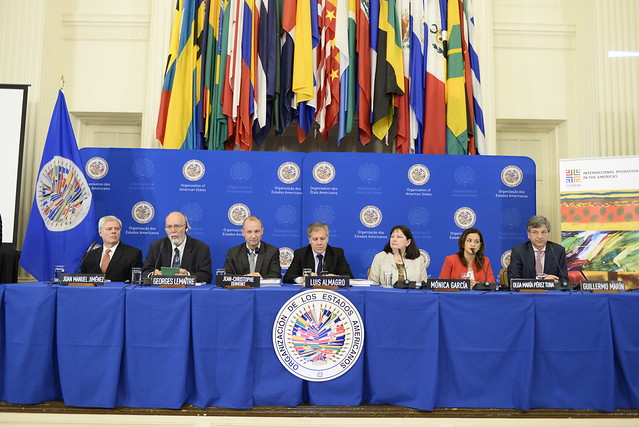- English
- Español
Media Center
Feature
Migration: When the Borders Expand
August 28, 2015"We should remind everyone that human rights are the central issue of all debates on migrants and migratory policies. All migrants, in virtue of their human dignity, are protected by international human rights law, without discrimination, in equality with citizens, regardless of their administrative situation or condition."
Luis Almagro
Secretary General of the OAS
Lucas Artelli, 26 years old, knows what it’s like to pack his bags. Since he was six years old, when he left his hometown of Fortaleza, Brazil, he´s been moving throughout the hemisphere.
Like many migrants in the Americas, Lucas left with his parents to wherever his father´s business took them. First he went to Mexico, where he lived a year and a half; next to Colombia and Peru, and later to the United States for his undergraduate degree.
The SICREMI Report 2015
In the countries of Latin America and the Caribbean, international migration increased by 17% between 2010 and 2013. At this rate of increase, the level of immigration flows would dou8ble in four years, according to the Third Report of the Continuous Reporting System on International Migration in the Americas – (SICREMI 2015), jointly produced by the OAS, 20 of its member countries and the OECD, with technical support from the Multilateral Investment Fund of the IDB.
The report also highlights:
- The growing immigration in Latin America and the Caribbean is essentially due to increasing intra-regional migration.
- The level of authorized migration increased 60 percent between 2010 and 2013, mostly in Argentina, Brazil, Chile, Colombia and Mexico.
- Large increases in immigrant populations occurred mostly within the same region or from neighboring regions.
- The United States is the main country of residence of the migrants of the region, with the following exceptions: for Nicaraguans, Costa Rica is the main country of residence; for Bolivians, Chileans, Paraguayans, and Uruguayans, it is Argentina; for Colombians, Venezuela; for Argentines, Spain; for Surinamese, the Netherlands, and for U.S. citizens, Mexico.
- In the Caribbean, 64% of immigrants come from the region itself.
- In relation to their population, Argentina, Barbados, Belize and Costa Rica have levels of permanent authorized migration higher than that of the US.
- In Brazil, Canada, Cuba and the United States the majority of immigrants come from outside the hemisphere.
- In Argentina, Chile, Costa Rica, the Dominican Republic, Ecuador, Mexico and Paraguay, the majority of migrants come from a single neighboring country.
- In the Southern Cone, permits based on international agreements have had a notable effect on migration.
- Migration to Spain from the Americas in 2013 was 86,000 people, one-fourth of its highest level in 2007, when it reached 344,000.
Migration and Human Rights
During the presentation of the Report, the Secretary General of the OAS, Luis Almagro, emphasized the need to defend the rights of migrants. “Migrants are, above all, human beings with human rights, and they cannot be presented only as agents of economic development. Migrants should also not be considered as defenseless victims, in need of rescue, nor as criminal impostors,” said the Secretary General.
“We should remind everyone that human rights are the central issue of all debates on migrants and migratory policies. All migrants, in virtue of their human dignity, are protected by international human rights law, without discrimination, in equality with citizens, regardless of their administrative situation or condition,” he added.
The reasons for migration
The reasons for leaving are diverse; in the case of Lucas, it began because of the needs of the business where his father worked, and later continued due to his studies. Now, he is driven to migrate because of his own work situation. Moreover, many people migrate in search of better economic conditions, or in search of security.
For Lucas, migration has a clear advantage: “Having lived in so many different countries has exposed me to different cultures, which has become an advantage in the labor market.” He doesn´t know if he´ll return to Brazil, his native country. “I am open to any possibility. I could if there were an interesting opportunity. But I could easily wind up in another country.”
Reference: E-223/15



